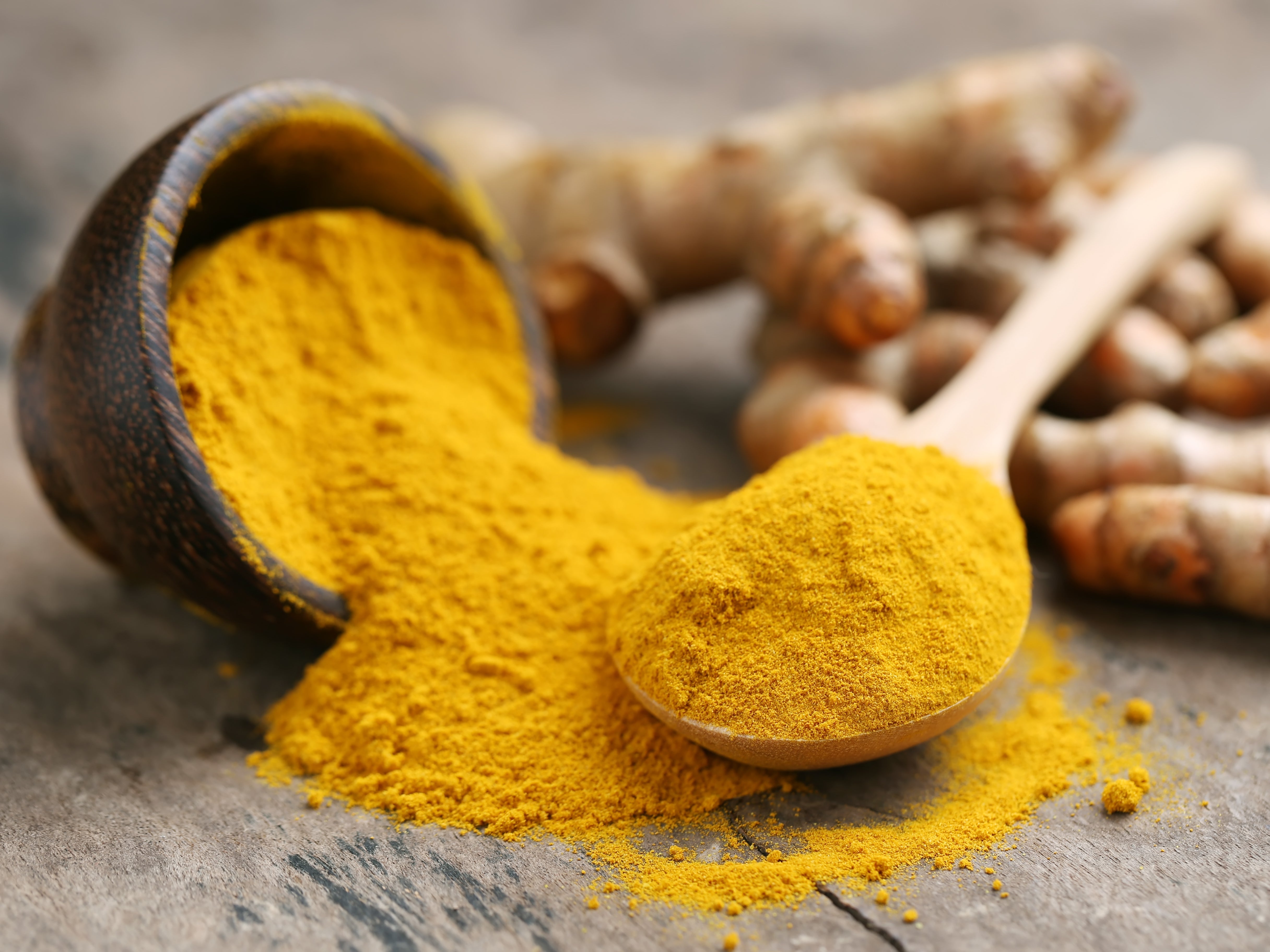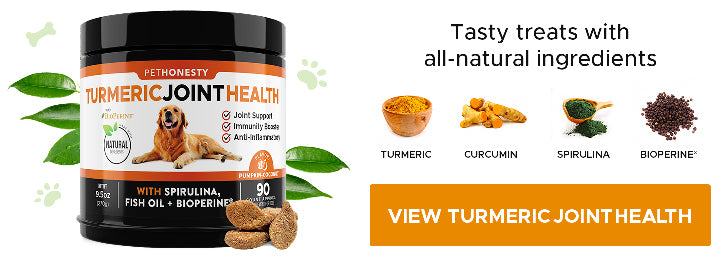If you have noticed your dog struggling to get up on the sofa or heard him groan as he rises off the floor to take his first few steps, you may be seeing the beginning stages of joint issues, especially if your dog is entering his senior years, aged seven and up. While you should always be giving your pup a daily dog digestive supplement, it may be time to also incorporate a joint supplement into his diet as well.
While prescription painkillers and anti-inflammatory drugs are an option, turmeric also serves as a homeopathic alternative. Here is everything you need to know about turmeric for dogs with joint discomfort.
While prescription painkillers and anti-inflammatory drugs are an option, there is a homeopathic alternative that is better in almost every way, and it goes by the name of turmeric. The healing benefits of turmeric in dogs, especially as they relate to joint issues, are genuinely unmatched. Here is everything you need to know about turmeric for dogs with joint issues.
What is Turmeric?
Turmeric is a flowering plant that belongs to the ginger family and is most commonly turned into a spice. According to Healthline, Turmeric contains the active ingredient curcumin, which is a potent natural anti-inflammatory with powerful antioxidant properties. Turmeric is best known as the substance which gives eastern cuisine from India and Pakistan its exotic golden hue.
What Are the General Health Benefits of Turmeric for Dogs?
Health benefits of turmeric have been praised in eastern cultures for thousands of years, but western medicine is finally catching on. Turmeric is a natural anti-inflammatory and painkiller. In fact, in a 2004 study conducted by the National Center for Biotechnology, turmeric went head to head with the reigning champ ibuprofen and came out the victor!

How Does Turmeric Help Joint Discomfort
As your dog ages, there are limited ways to combat the discomfort and swelling that come as a result of bones rubbing against one another. Cartilage is what kept your dog's bones from grinding against one another, and once this wears down, your dog will begin to experience discomfort. The lack of a buffer zone between the joints creates a sensation that is best described as dull throbbing aches.
Due to the friction caused by a lack of cartilage, the throbbing and aching that your dog is experiencing is accompanied by non-normal inflammatory response. Non-normal inflammatory response occurs when the muscle tissue around the bones has to work harder to compensate for the insufficient cartilage. This extra work results in a buildup of lactic acid and ultimately, chronic non-normal inflammatory response.
Turmeric root helps to support normal inflammatory response. But how exactly does turmeric do the things it is claimed to do?
As the body digests and absorbs turmeric root, the chemical curcumin enters the bloodstream. Thanks to its high pH level, and basic properties, curcumin directly combats the non-normal inflammatory effects of lactic acid in the body, as proven by the NCBI. As swelling subsides and the non-normal inflammatory response goes down, discomfort and pressure from swelling dissipate.
Can My Dog Take a Pure Curcumin Supplement Instead?
Your dog can certainly take a supplement with only extracted curcumin, but according to Healthline, it may not provide the same results. Curcumin works best when it is combined with the other curcuminoids that are present in turmeric. These other curcuminoids are named demethoxycurcumin, and bisdemethoxycurcumin. By isolating the individual molecular components of curcumin from turmeric, you lose essential chemical agents that help it to function correctly after ingestion.
Curcumin is the chemical agent within turmeric that contains the highest marker of anti-inflammatory agents. However, the other curcuminoids that it bonds with the inside of the turmeric plant help with things like digestion and absorption of curcumin.
Taking straight curcumin is not bad for your dog, and if he has an aversion to turmeric, it may be a good alternative. However, as you increase the potency of any substance by means of isolation, the greater the risk of adverse side effects.

More Pepper!
While turmeric is excellent, your dog's system may need a little help in absorbing the nutrients properly. Black pepper is the ultimate catalyst for turmeric. The chemical agent piperine, present in black pepper, will allow your dog to absorb the chemical agent curcumin at a rate of 2000% more efficiency.
The chemical agent piperine is an alkaloid, which means it is a nitrogen-based organic compound. These types of organic compounds have the unique ability to permeate cell walls with ease inside the body.
According to NCBI, when combined, piperine binds with curcumin due to their compatible molecular structures. This creates an effect wherein curcumin can pass through the intestinal wall with a staggeringly higher success rate. Furthermore, piperine slows down the dissolution of curcumin by the liver, meaning more curcumin stays in the bloodstream for a more extended period.
How Do I Administer Turmeric to My Dog?
Once you have decided that turmeric is a supplement you want to add to your dog's diet, you will be left with the choice of how to administer it to him. There are several methods and products available that make turmeric consumption easy for dogs.
Turmeric chews are a popular choice amongst dog owners, as they can be given as daily supplements, or crumbled on top of food. Tinctures are another popular method of distributing turmeric extract to a dog. In tinctures, the turmeric is dissolved into a dog-friendly oil like olive oil or coconut oil and can be administered directly with a syringe or poured over food before meals.
The Golden Turmeric Paste
In addition to these popular methods, you may be interested in a homemade turmeric paste like the one found in Dogs Naturally Magazine. One such paste that has many dog owners over the moon for turmeric is called "golden paste."
Are you ready for some homemade alchemy!? This delicious golden turmeric product will have your dog begging for more and may produce some pavlovian habits when he sees you reaching into the spice cabinet.
Ingredients:
1 cup organic turmeric powder (organic means a higher curcumin content)
3 cups cold, filtered water
3 teaspoons ground pepper - the fresher, the better, try grinding it yourself if possible
½ cup organic coconut oil
Directions:
Place turmeric powder in a small pot on the stove
Whisk in 2 cups of water slowly
Bring the mixture to a simmer, adding the last cup of water intermittently until the paste is thick
Once the paste reaches the consistency of oatmeal, turn off the heat
Stir in the coconut oil and black pepper
Allow the mixture to cool and place in a glass jar.
Refrigerate for two weeks
Dogs can have golden paste every day but be sure to limit the quantities at first. Typically the dose of golden paste should be as follows:
0-20 lbs: ¼ teaspoon daily
21-40 lbs: ½ teaspoon daily
41-64 lbs: ¾ teaspoon daily
65+ lbs: 1 teaspoon daily
Whenever you introduce something new into your dog's diet, it is important to monitor him for adverse health effects and allergic reactions. If your dog exhibits any vomiting, excessive drooling, tremors or multiple days of diarrhea, stop the dosage and consult your vet. Turmeric is extraordinarily dog-friendly and very safe in small doses, but adverse reactions can occur, so be vigilant and start slow.
Turmeric for Brain Health
In older dogs, joint issues are often paired with dementia. Dementia itself can be a troublesome disease, and it often comes on rapidly and seemingly out of nowhere. In addition to being an excellent remedy for joint issues, the positive tumeric for dogs benefits have also been observed in its prevention of mental deterioration like Alzheimers and dementia. While the positive effects of turmeric on the brain are still not fully understood, studies conducted by NCBI have shown that those who have a diet high in turmeric are significantly less likely to develop Alzheimers or dementia.
Turmeric for Preventative Joint Health
Even if your dog does not suffer from joint discomfort, joint health is a crucial part of your dog's life. To keep the rest of his body, mind, and spirit healthy, your dog requires activity and movement. Movement is integral for so many things in your dog's life like preventing anxiety and stress, keeping his gastrointestinal tract working properly, and even keeping his muscles and joints in good shape. Being comfortable is the key to keeping your dog active and moving, and turmeric is just as much a preventative for joint health as it is a solution for joint discomfort.

Side effects of turmeric
For all these great benefits that turmeric offers, there has to be a catch, right? Well, according to The Whole Dog Journal, turmeric doesn't have negative side effects so much as it has guidelines and stipulations. Here are a few of them:
1) Turmeric thins the blood. Again this is not necessarily bad, as thin blood helps reduce the risk of heart attack and stroke. However, if combined with other blood-thinning medications, medical complications could arise. Always consult with your vet beforehand.
2) Turmeric could make your dog stink. There is a notable scent that comes from a high curry diet, but since your dog doesn't sweat the same way humans do, and because of the low dosage, this will probably never come up.
Stay Golden
Overall, turmeric is a wonderful natural remedy for your dog's joint discomfort. Turmeric's ability to fight joint discomfort and non-normal inflammatory response simultaneously make this supplement a no brainer. For dog owners looking to keep their dog naturally healthy, while still providing comfort and care, look no further than your spice rack.

















